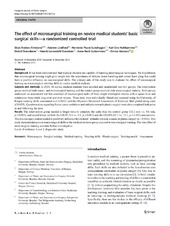The effect of microsurgical training on novice medical students' basic surgical skills - a randomized controlled trial
Almeland, Stian Kreken; Lindford, Andrew; Sundhagen, Henriette Pisani; Hufthammer, Karl Ove; Strandenes, Eivind; Svendsen, Henrik Løvendahl; Guttormsen, Anne Berit; Hansson, Emma
Peer reviewed, Journal article
Published version

Åpne
Permanent lenke
https://hdl.handle.net/1956/22326Utgivelsesdato
2019-12-26Metadata
Vis full innførselSamlinger
Originalversjon
https://doi.org/10.1007/s00238-019-01615-wSammendrag
Background: It has been demonstrated that medical students are capable of learning microsurgical techniques. We hypothesize that microsurgical training might give insight into the importance of delicate tissue handling and correct knot tying that could have a positive influence on macrosurgical skills. The primary aim of this study was to evaluate the effect of microsurgical training on macrosurgical suturing skills in novice medical students. Subjects and methods: In 2018, 46 novice medical students were enrolled and randomized into two groups. The intervention group received both macro- and microsurgical training and the control group received only microsurgical training. Both groups underwent an assessment test that consisted of macrosurgical tasks of three simple interrupted sutures with a square knot and continuous three-stitch long over-and-over sutures. These tests were individually filmed and assessed using the University of Bergen suturing skills assessment tool (UBAT) and the Objective Structured Assessment of Technical Skill global rating scale (OSATS). Questionnaires regarding future career ambitions and attitudes towards plastic surgery were also completed both prior to and following the tests. Results: The intervention group needed a longer time to complete the tasks than the control group (12.2 min vs. 9.6 min, p > 0.001), and scored lower on both the UBAT (5.6 vs. 9.0, p > 0.001) and the OSATS (11.1 vs. 13.1, p > 0.001) assessments. The microsurgery course tended to positively influence the students’ attitudes towards a career in plastic surgery (p = 0.002). This study demonstrates poorer macrosurgical skills in the medical students group exposed to microsurgical training. The true effect of microsurgical training warrants further investigation. Level of evidence: Level I, diagnostic study.
